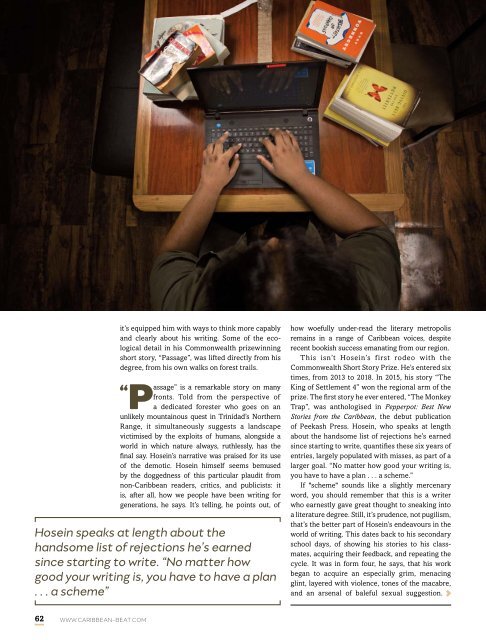Caribbean Beat — November/December 2018 (#154)
A calendar of events; music, film, and book reviews; travel features; people profiles, and much more.
A calendar of events; music, film, and book reviews; travel features; people profiles, and much more.
You also want an ePaper? Increase the reach of your titles
YUMPU automatically turns print PDFs into web optimized ePapers that Google loves.
it’s equipped him with ways to think more capably<br />
and clearly about his writing. Some of the ecological<br />
detail in his Commonwealth prizewinning<br />
short story, “Passage”, was lifted directly from his<br />
degree, from his own walks on forest trails.<br />
“<br />
Passage” is a remarkable story on many<br />
fronts. Told from the perspective of<br />
a dedicated forester who goes on an<br />
unlikely mountainous quest in Trinidad’s Northern<br />
Range, it simultaneously suggests a landscape<br />
victimised by the exploits of humans, alongside a<br />
world in which nature always, ruthlessly, has the<br />
final say. Hosein’s narrative was praised for its use<br />
of the demotic. Hosein himself seems bemused<br />
by the doggedness of this particular plaudit from<br />
non-<strong>Caribbean</strong> readers, critics, and publicists: it<br />
is, after all, how we people have been writing for<br />
generations, he says. It’s telling, he points out, of<br />
Hosein speaks at length about the<br />
handsome list of rejections he’s earned<br />
since starting to write. “No matter how<br />
good your writing is, you have to have a plan<br />
. . . a scheme”<br />
how woefully under-read the literary metropolis<br />
remains in a range of <strong>Caribbean</strong> voices, despite<br />
recent bookish success emanating from our region.<br />
This isn’t Hosein’s first rodeo with the<br />
Commonwealth Short Story Prize. He’s entered six<br />
times, from 2013 to <strong>2018</strong>. In 2015, his story “The<br />
King of Settlement 4” won the regional arm of the<br />
prize. The first story he ever entered, “The Monkey<br />
Trap”, was anthologised in Pepperpot: Best New<br />
Stories from the <strong>Caribbean</strong>, the debut publication<br />
of Peekash Press. Hosein, who speaks at length<br />
about the handsome list of rejections he’s earned<br />
since starting to write, quantifies these six years of<br />
entries, largely populated with misses, as part of a<br />
larger goal. “No matter how good your writing is,<br />
you have to have a plan . . . a scheme.”<br />
If "scheme" sounds like a slightly mercenary<br />
word, you should remember that this is a writer<br />
who earnestly gave great thought to sneaking into<br />
a literature degree. Still, it’s prudence, not pugilism,<br />
that’s the better part of Hosein’s endeavours in the<br />
world of writing. This dates back to his secondary<br />
school days, of showing his stories to his classmates,<br />
acquiring their feedback, and repeating the<br />
cycle. It was in form four, he says, that his work<br />
began to acquire an especially grim, menacing<br />
glint, layered with violence, tones of the macabre,<br />
and an arsenal of baleful sexual suggestion.<br />
62 WWW.CARIBBEAN-BEAT.COM


















